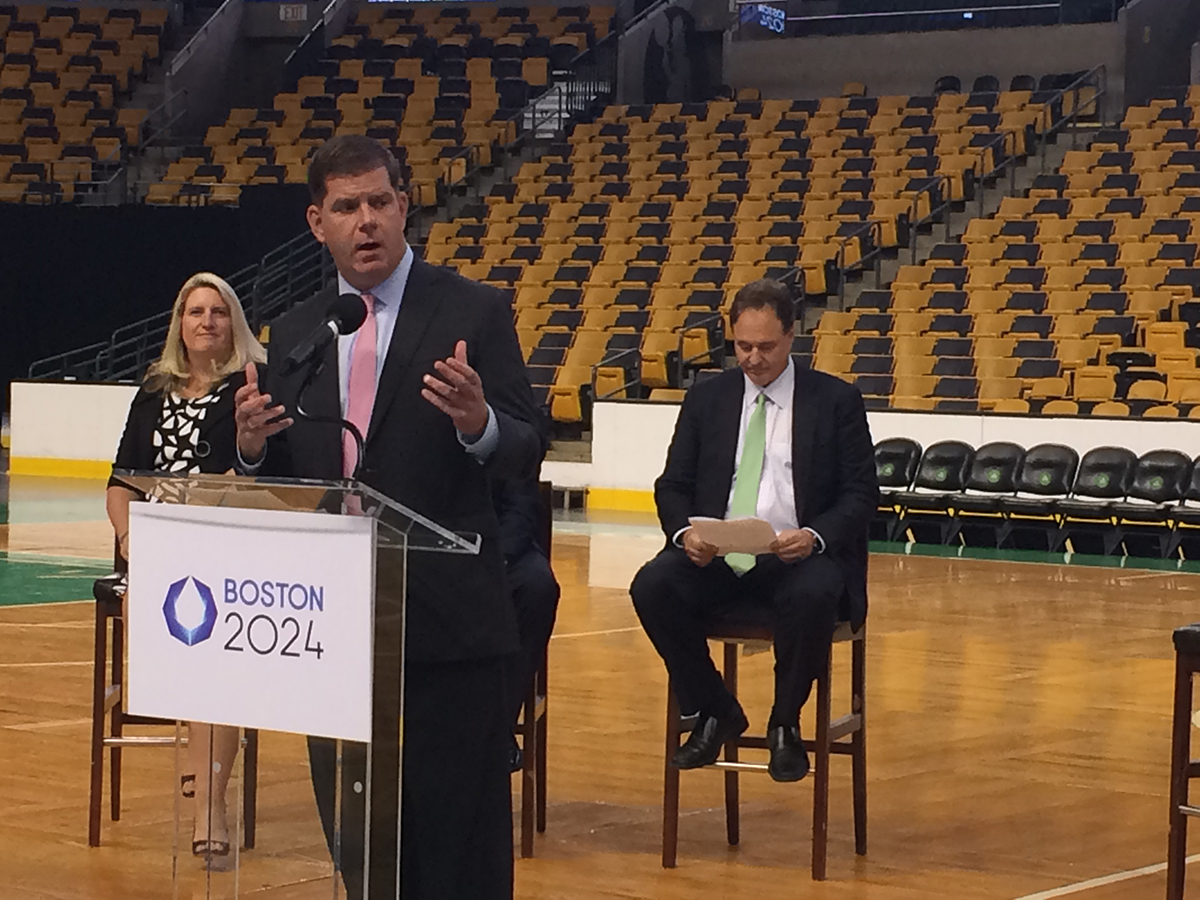Boston 2024’s Pagliuca, Mayor Walsh Grilled on Transportation at TD Garden Announcement

Photo by Kyle Clauss
Boston 2024 formally announced TD Garden as a venue in its so-called Bid 2.0, hosting Olympic and Paralympic men and women’s basketball finals, as well as Olympic gymnastics. It is the first venue from the initial “proof of concept” bid book presented by the USOC in December to be included in the revised version.
Standing on the Garden’s parquet floor, Boston 2024 Chairman and Celtics co-owner Steve Pagliuca made the announcement alongside Mayor Marty Walsh, Delaware North’s Boston Holdings CEO Charlie Jacobs, TD Garden President Amy Latimer, and Olympians Aly Raisman and Jo Jo White.
During media availability, WBZ-TV’s Jon Keller grilled Walsh and Pagliuca on the possibility that North Station, a critical hub for transportation both in and out of the city, would be shut down for a prolonged period of time for security concerns, as it was for the 2004 Democratic National Convention. “I don’t know about any displaced commuters, but what I do know is, we’re going to have all the best security experts, and the security experts will make sure that the transportation is running fine and is open,” Pagliuca said.
“So you don’t have a plan if they close North Station?” Keller pressed.
“Well, we are looking—The bid is an interim process, and we have experts in security,” Pagliuca said. “We have the government working hand in hand with all the folks, and that’ll come out over time.”
“The Secret Service oversees national security and no one else,” Keller said. “They have the final say. And they shut down I-93 and North Station—both commuter rail and the T—last time. Aren’t you concerned about that happening again?”
“I can’t comment on what the Secret Service did or didn’t do last time. But what I can comment [on] is, we’re going to try to make this be as best as possible secure Games, and a Games that is very compact and walkable,” Pagliuca said. Later, Keller put the question to Walsh.
“As they put out a plan, a security plan, and we expect them to be working with my Boston Police Department, with State Police, with the MBTA Police,” Walsh said. “A big part of the Olympic movement here in the city of Boston is by using the MBTA to move people in and out of venues, and I think that we can’t have an Olympics if the T is shut down. And I think that the circumstances are going to be very different around what the 2004 Democratic Convention was.”
When Keller noted that the risk of a truck bomb was too great to keep I-93 open in 2004, Walsh deferred to past Games hosted in the United States. “In the particular case of the Olympics, having the Olympics in Boston, we need to have the MBTA open as part of the moving. If you look around the world, you have the Olympics that happened in the United States, the public transportation system was open during those Olympics,” he said.
WCVB’s Janet Wu asked Walsh if he was okay with taxpayer dollars backing bonds to buy land for venues. “No, that’s one of the questions that—that’s out of the question,” Walsh said. “What we are comfortable [with] looking at [is] tax incentives, and tax financing, such as I-Cubed and TIFs and things like that. Absolutely open to that.”


